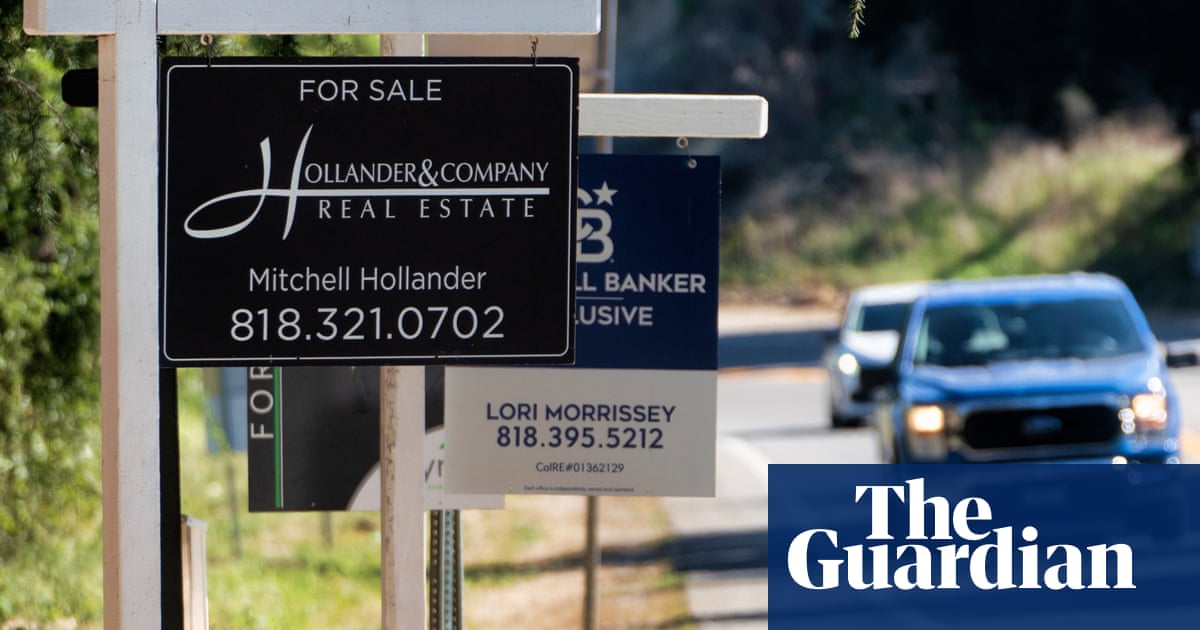The median existing house price increased 3.4% from a year earlier to $391,800, the highest for any October.
OP is calling out the base price increase, but if you do the math, the real culprit is what the article is, rightly, focusing most of its time on. Interest rates.
Interest rate increases are the main reason why mortgage payments have skyrocketed recently. The math doesn’t lie. Any loan calculator will show you that the 2019 to 2023 interest rate changes are like a damn sledgehammer.
That is correct, interest rates are high on purpose to slow inflation. Now I know I’ll never sell my house because at 2.4% interest I’d be stupid to do that and then have a 7.9% interest rate on a new home.
Which obviously has knock on effects as people like me will never be able to buy a first home because others aren’t selling theirs (understandably) due to the high interest rates…
I was never really ok with the idea that retirement was only for the well off, but now we’re getting to “literally anything one considers part of a normal life is only for the wealthy now.” Considering home ownership is pretty much a necessity for retirement as you can work on a budget, now both seem like mythical creatures one only encounters in fairy tales. :/
Hey, FWIW, there are even blockers to maintaining homeownership now. Property taxes in some locations keep skyrocketing, making the attempt of just sitting still in one’s home become less and less attainable. I’ve seen those in retirement/fixed income having to sell their house and leave where they live due to the static cost of living climbing too high to be able to continue to afford. Every kind of home maintenance cost has exploded since 2020, further stretching the ability for one to sit still and live.
Just straight existing seems to be increasingly challenging. It’s annoying and unacceptable.
When I was in my twenties I felt the same way. Now in my forties I have more than enough saved for retirement, I have a pension in place, and living debt free minus house and a car payment. Things will change as you age to a point where retirement is a possibility.
Things changed quite a lot in the last 20 years. You and I are fortunate in that regard. On top of (presumably) having other advantages including good paying jobs.
I bought my house in the Denver suburbs about 20 yrs ago on a mid-career IT salary and it was affordable (well within my means) at the time.
The house is now worth about 3X what I paid. I seriously doubt mid-level IT salaries have tripled. Hell, my own salary hasn’t even tripled from raises in 20 years. I can’t imagine how people can afford housing in major cities like this unless they’re on the higher end of the middle class.
Not everyone gets a 401k. Not everyone can cut their budget any further and still save. If you can save, if you have a 401k, max it out. Max your Roth if you can. In 20 years you will have a lot more money. But if you are living hand to mouth the system we have basically says “fuck you”.
The middle class has been squeezed ever tighter for some 40 or 50 years now. Wealth has been gushing from the bottom to the top since the 80s.
Gen X was in the same boat until 2010. As a generation we dealt with constant setbacks and a 20 year war. As GenX takes over things the barriers will crumble and Millennials will start becoming successful as well. Gen Z and Alpha might be screwed because of the population size of the Millennials, but the path won’t be as difficult as it is right now.
The biggest barrier is wage stagnation so boosting wages across the board by 20% will help matters.
You have a lot more confidence in the Reagan generation than I do as an elder millennial.
Lucky you. It won’t be that way for many (I’m only not saying most because I don’t have a source to hand to back it up on my phone).
So supply is low and home prices are increasing. Not good for home buyers.
Interest rates are also high.
I had a mortgage in 2005 with 7.5% interest. The cost of homes is 2-4x as much now but I’m only making 20% more.
I had a mortgage in 1998 with 7.5%.
I do make quite a bit more now but I am not sure I would be able to buy my current house at today’s prices (I refinanced when interest rates were low).
On one hand, I don’t like when I read about ‘astronomical interest rates’ when I know the rates in the 70s, 80s and 90s were the same or higher than what we’ve had in the last 15 years. I’d prefer people understand that it’s the wages not rising along with price inflation that’s the issue.
This is exactly the issue I had. Infuriating as it is, I finally clawed my way up to a position where I could earn enough to buy a house and then COVID hit and destroyed everything… Now I’m back to having to live in someone else’s garage, paying their entire mortgage payments in rent prices for the rest of my life…
“Fun.”
I bought a place in 2019 that I could in no way afford at the current rates. The mortgage would be roughly $1000 more per month. Just not possible.
The big driver is the interest rate, not the base price increases.
Home price increases, going up about 3%, have pretty much tracked with the inflation rate. 3% on the base will add a bit to your mortgage payment, but no where close to what doubling the mortgage interest rate will do.
Just jump into a loan calculator and see what happens when you bump up the base price 3% vs. shifting the interest rate from 2019 to 2023 values.
deleted by creator
But corporate landlords don’t pay mortgages…
They buy with cash, and tend to hold houses indefinitely. Which is another reason sales are decreasing. Humans sell their houses for a myriad of reasons. A corporation that rents housing isn’t going to sell unless the corporation shuts down. They’re going to keep that steady rental income because humans can’t afford a mortgage to stop renting.
Corporate landlords are buying with loans. If you have the cash to buy one house outright you will instead put 10% down on 10 houses and have 10 houses to rent. See an accountant for details - including what the best amount to put down is (I picked 10% only because it makes the math easy)
If interest is cheap, sure.
When interest is high, borrowers can’t afford to get a mortgage, and corporations pay cash.
But theyre not getting mortgages, they’re getting business loans. And they’re not making down payments, they’re using existing property as collateral on the loans.
I’d say that’s something a layman wouldn’t know and someone might need to talk to an account, but our most recent ex-president is going through a pretty high profile court case about it right now…
I dunno, as an actual accountant it’s not like I deal with any of this stuff on a day to day basis. I don’t know what knowledge I’ve gained through mitosis, but I did assume everyone would know without having to explain that. So maybe you’re right? Or maybe you just don’t understand it so you think no one else can?
If you cannot get a loan, then real estate is a much less powerful investment. Cash flow is key, if you have one properties that you put each down $20k, pay $1000/month on and rent for $1200 that is $2000/month in extra cash. If you instead buy the property for 200k you get $1200 in cash per month. Of course in reality you will never have all your property rented all the time, so it is more reasonable to say with 10 properties you get $1600/month - and sometimes get a $200 bonus while with 1 you sometimes have $1200 and sometimes $0 - which is much harder on the budget.
Of course anyone thinking about this needs to see an accountant to run all the different numbers, but in general real estate generally only makes sense if you can take a loan and thus have less risk.
deleted by creator
Yes, the interest rates are much higher, which makes mortgages cost a lot more. But they aren’t literally double. A $250k mortgage at 3% is roughly $1200/mo vs $1700/mo at 7%.
deleted by creator
A $500,000 loan goes from $2182 to $3400 from 3% to 7%. A $1,000,000 loan goes from $4363 to $6835. Still not double.
Doubling the rate doesn’t double the total payment, only doubles the interest payment.
deleted by creator
I WONDER WHY THAT IS.
Well the market is trying to correct itself it seems. The prices should plateau at some point you would think, unless it’s still just all these cash buyers/corps salivating for property.
i guess corporations with lots of cash on hand just look for ways to put money to work… they’ll continue to put it into real estate as long as it looks like a better long term investment than something else…
House prices never come down unless the local economy crashes.
When stocks dip, you buy up the dip.
I saved for years before I bought my second house (was living in my ‘starter home’ for wayyy longer than expected) and I didn’t think I’d be able to afford a much better house than I already had - prices were exploding, houses didn’t stay on the market for more than a few days at the most, and I just couldn’t see paying so much more than I could reasonably afford for a house that wasn’t much better than I already owned.
Then 2008 happened, and suddenly I was the only buyer and I watched homes prices plumment in their listings. I bought a house that I’d seen listed at $360,000 just six months prior for $219,000 and scooped it up.
It’s one of the few times in my life I actually was able to take advantage of ‘the dip’, but it took 10 years of saving while living in a house that was way too small for my family.
That’s how we got into this problem.
I checked the value of my home on Zillow. It’s crazy high. Like, ridiculously high. And now interest rates have gone up.
There are still empty homes that aren’t owned by venture capital firms?
Thanks for the post!
Interesting to see how the housing market is doing.
Is it artificial low supply, so high demand? Since many laws were implemented to hault building new working class homes in most dense populated areas, or I am just wrong and don’t know too much?
No, that’s pretty accurate. There is new construction, but not nearly enough, and more importantly not dense enough to satisfy demand.
People still want to live in cities, but often denser buildings are blocked. And people that want to live in suburban areas can’t afford the homes being built.
People who want to live in rural areas are fine, because the demand for those homes is so low. Not many people want to live in bumfuck Ohio.
This is about existing home sales. From what I can tell (on very limited information) new home sales are still at normal levels. People who don’t have a house are buying a new one, as are people looking to upgrade.
Thank you for taking the time to explain!
Seems cash is becoming king again?
All-cash sales accounted for 29% of transactions compared with 26% a year ago. Distressed sales, including foreclosures, represented only 2% of transactions, virtually unchanged from the previous year.
I work with a lot of tech directly related to the mortgage industry, and it’s kind of crazy to look at the data. Mortgage originations plummeted as interest rates rose (less people buying houses) but new construction - especially on lots that had been cleared but had been sitting undeveloped for several years - exploded in a rush, and it’s not clear why.
I’ve been through previous mortgage corrections and this one is pretty tame by comparison to some others - the hard part about buying a house is that prices will rise for years upon years and waiting for a correction seems risky when you see prices rising out of your affordability. But in the past, it has always been true that the market will level out over time.
I’m guessing a lot of that are townhomes built on old cleared lots. The supply of affordable SFH in a lot of cities is pretty slim but these townhouses are going up all over the place and you can fit 4-6 of them on the same lot some old run down 1950s house used to occupy.
Thank you for the input!
That’s not how supply and demand work. Low supply doesn’t drive demand higher; demand is usually independent of the supply. However low supply for any given demand will cause prices to increase.
And what makes you think the supply “artificially” low? There’s not a big conglomerate somewhere holding on to a large enough tranche of housing to cause a dip in supply, most likely.
It’s low supply because homeowners with record-low interest rates are less interested in selling and moving, since the monthly payment they pay right now be for less house. It’s a side-effect (or maybe the main effect? I’m not an economist) of the fed increases.
I think they’re referring more to artificial restrictions like single-family zoning, setback requirements, parking minimums, etc.
To take Manhattan as an example, 40% of the buildings could not be legally built today because they would violate zoning laws. A huge amount of San Francisco is under single-family zoning, and so low density - and given fixed land, low supply - is artificially enforced, which probably has something to do with it being one of the most expensive housing markets in the country.
edit: removed off topic, added blackrock conspiracy video
Thanks for the input!
I have heard of companies buying up ‘would be first time buyer’ homes and renting them out.
Similar to this moderate random video on subject:
Why Wall Street Is Buying So Many U.S. Homes [12:33 | CNBC] https://www.youtube.com/watch?v=iLsZlrZIFwU
The Blackrock Conspiracy Debunked [20:54 | The Hated One] https://www.youtube.com/watch?v=STYgeA9VScc















